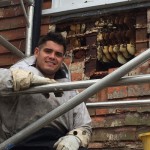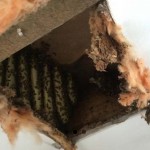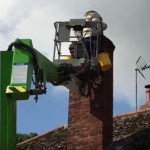Spring is well and truly here and the bees are very busy bringing in pollen and nectar, with the colony sizes building up well.
Locally, we’ve heard reports of the first “swarm calls” – members of the public asking beekeepers to come and collect swarms that have temporarily settled in an inappropriate place. As well as the honey bees, other bee species are active too, and we’ve had a couple of calls about bumble bees and mining bees. We can’t do anything with these, other than reassure householders that “their” bees probably won’t do any harm.
While bee swarms can often be collected from their “temporary” location (in a tree or on a wall), once honey bees settle into a new permanent home a whole new set of problems arise. Bees like secure, enclosed spaces and in our towns that can often mean a chimney, a roofspace or ventilation duct. There, they can create issues by causing blockages, having flightpaths in conflict with people, or even damaging structures with dripping honey and wax deposits. As beekeepers, it’s usually impossible for us to help in these situations; once inside a cavity with a small entrance, the bees have achieved their objective of safety. We’re no more qualified than the next person to start doing structural works or working at heights. Beekeepers don’t carry insurance for this kind of activity, for one thing. Sadly some householders may try to take matters into their own hands, smoking bees out of a chimney or worse, attempting to use chemicals to kill the bees off. This last approach carries a big risk; bees are not protected as such, but allowing pesticides to enter the human food chain is against the law and by poisoning your bee colony you’re leaving tainted honey for other colonies to rob.
When contacted by distressed householders with bees in chimneys, sheds, flues etc we generally try and establish to what extent they’re really likely to be a problem. If their flight path is out of the way – or can be diverted to avoid people – very often just learning to live with and appreciate your new neighbours is the best solution. However we are aware of one – and only one – company that will happily take on the safe removal of bees from property. They not only don’t harm the bees, passing them on to a local beekeeper for re-homing, but actually guarantee that the same space won’t be re-colonised by bees for up to 25 years, taking steps to make the location bee-proof. They’re not only expert bee-keepers themselves, they also have a background as professional builders and come with all the right kit – scaffold towers and/or cherry pickers – to get the job done safely, efficiently and legally. Inevitably this service can’t be provided cheaply, but it’s definitely worth giving them a call if you find yourselves with an unwelcome bee colony as they can give you expert advice and an idea of the likely cost for your particular situation. Contact BeeGone Honeybee Removal on 0800 9551 999 or find out more at www.beegone.co.uk/



